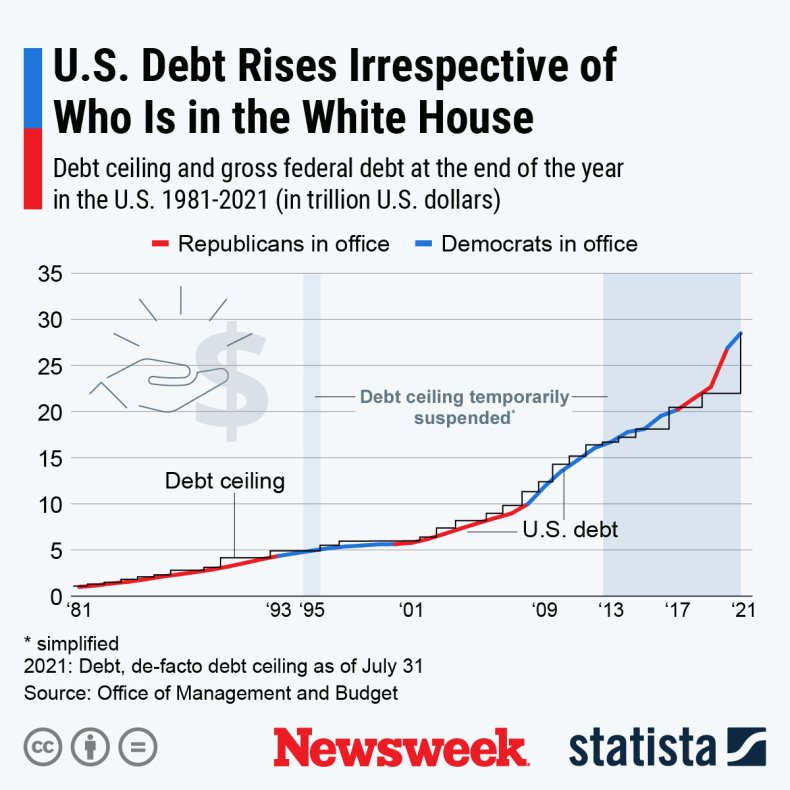Is Government Shutdown Continued on Monday
The U.S. government could be heading for shutdown after Senate Republicans blocked on Monday a bill that would have temporarily continued funding for the federal government.
Funding will run out at midnight on Thursday, September 30 unless Democrats and Republicans can agree on a measure. Hundreds of thousands of federal employees could be furloughed if they fail to do so. And, if the shutdown lasts too long, there are concerns that the U.S. could fail to pay its debts, resulting in potential economic chaos.
Republicans in the Senate refused to approve a resolution passed by the House of Representatives that would have funded the government because it included raising the debt ceiling, which has become a flashpoint in the partisan dispute.
It is not yet clear what the next steps will be but Democrats in the House might introduce a new measure to fund the government before the midnight deadline on Thursday, in the hope of winning GOP approval.
However, any new proposal that includes raising the debt limit is likely to suffer the same fate in the evenly divided Senate.
Senate Minority Leader Mitch McConnell told CNN on Monday: "Let me make it abundantly clear one more time: We will support a clean continuing resolution that will prevent a government shutdown."
"We will not provide Republican votes for raising the debt limit," he added.
Senate Majority Leader Chuck Schumer called Republicans' position "unhinged" and warned against a possible debt default by the U.S. government, saying it would "send markets crashing and interest rates skyrocketing."
Speaking from the Senate floor, Schumer said: "There is no scenario on God's green Earth where it should be worth risking millions of jobs, trillions in household wealth, people's social security checks, veterans benefits, and another recession, just to score short-term meaningless political points."
"That's what Republicans seem fixated on doing," he said.
A government shutdown would see hundreds of thousands of non-essential federal workers placed on furlough. The last time that happened was between December 21, 2018 to January 25, 2019 during the Trump administration.
The longest government shutdown in history, the 2018/2019 furlough saw some 800,000 federal employees go without two paychecks and miss pay for 35 days.
It is not clear how long a potential shutdown would last if the deadline passes on Thursday without a resolution, because it would only end once funding for the government is agreed.
There is the added concern of a potential sovereign debt default. In a letter to Congress on Tuesday, Treasury Secretary Janet Yellen said that she estimated her department would "exhaust its extraordinary measures" by October 18 if the debt limit was not raised or suspended.
Yellen warned that the U.S. might not be able to "continue to meet all the nation's commitments after that date" in comments that appeared to be hinting toward a potential default.
The graphic below, proved by Statista, shows gross federal debt at the end of the year from 1981 to 2021.

The date when the U.S. government will default on its debts is known was the "X Date" and cannot be known with complete certainty.
A U.S. debt default would have enormous and potentially unprecedented implications for the U.S. and international economies and possibly cause a global recession.
"The debt limit is a shared responsibility, and I urge Congress to come together, in that spirit," Speaker of the House Nancy Pelosi wrote in a letter to members of the House last week.
"Congress, as always, is ironclad in its commitment to never letting the full faith and credit of the United States come under threat," she said.
A government shutdown of any length would be a major challenge for President Joe Biden's administration and the Democrats, while the impasse over the debt ceiling appears to have no immediate solution.

sheltontaintimand1972.blogspot.com
Source: https://www.newsweek.com/will-government-shutdown-debt-ceiling-battle-us-economic-calamity-1633403
0 Response to "Is Government Shutdown Continued on Monday"
Post a Comment